| Srl | Item |
| 1 |
ID:
166024
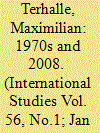

|
|
|
|
|
| Summary/Abstract |
Many Western and non-Western scholars consider the 2008 financial crisis a fundamental caesura, precipitating a decentred globalism. However, they have neither conceptualized the foundations of the dynamics that developed before this caesura nor have they theorized the amalgamating process which ultimately merged the hitherto overlooked and the formerly predominant Western forces and actors. Addressing this deficit, this article presents two innovations. First, it re-conceptualizes the 1970s by integrating two macro-developments: China’s deviation from patterns of the former Third World’s development and the thickening of liberal politico-economic institutions. Their relationship was complementary, but independent, since heterogeneous purposes drove these strands. Neither was disrupted by the end of bipolarity. Thereby, this article offers the first narrative of the years 1970–2008, viewing them as the incubation period of both strands’ simultaneous development before their fusion in ‘decentred globalism’. Consequently, the 1970s supersede International Relations (IR’s) hegemonic benchmark date of 1989–1991. Second, the article accounts for the merging of macro-developments. It argues that, despite regularities, international social life is characterized by heterogeneous purposes derived from different social contexts, reflecting an environment that operates in multidirectional ways. Large trends in the environment, such as those of the 1970s, may coincide at contingent points in time (e.g., 2008). Based on comprehensive reviews of distinct literatures, these two innovations emerge as the key building blocks for the development of a theory of benchmark dates for a ‘decentred’ global order.
|
|
|
|
|
|
|
|
|
|
|
|
|
|
|
|
| 2 |
ID:
064083
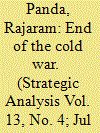

|
|
|
| 3 |
ID:
017809


|
|
|
|
|
| Publication |
Aug 2000.
|
| Description |
3-8
|
|
|
|
|
|
|
|
|
|
|
|
|
|
|
|
| 4 |
ID:
055265


|
|
|
| 5 |
ID:
021471
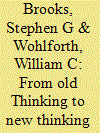

|
|
|
|
|
| Publication |
Spring 2002.
|
| Description |
93-111
|
|
|
|
|
|
|
|
|
|
|
|
|
|
|
|
| 6 |
ID:
061251


|
|
|
| 7 |
ID:
163444
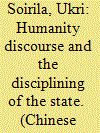

|
|
|
|
|
| Summary/Abstract |
Since the end of Cold War, international legal discussion and practice has been increasingly permeated by what this article calls “humanity discourse”. The article analyzes the discourse from a critical perspective. The main argument of the article is that the humanity discourse contributes to what Anne Orford has called the “battle for the State”, and consequently to the neoliberal project which is now a hegemonic power in global law and policy. This argument is supported both by an analysis of humanity discourse in academic discussions and an analysis of how humanity language has been used in practice.
|
|
|
|
|
|
|
|
|
|
|
|
|
|
|
|
| 8 |
ID:
018804


|
|
|
|
|
| Publication |
Winter 2000/01.
|
| Description |
5-53
|
|
|
|
|
|
|
|
|
|
|
|
|
|
|
|
| 9 |
ID:
021470


|
|
|
|
|
| Publication |
Spring 2002.
|
| Description |
70-92
|
|
|
|
|
|
|
|
|
|
|
|
|
|
|
|
| 10 |
ID:
056023
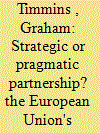

|
|
|
| 11 |
ID:
077294


|
|
|
|
|
| Publication |
2007.
|
| Summary/Abstract |
This article examines the factors that led to the end of the Cold War from the perspective of the most important U.S. decision makers in both the Reagan and Bush presidencies. The centerpiece of the analysis is a longitudinal study that compares the timing of U.S. decision makers' assessments of the nature of the Soviet threat with changes in Soviet power, foreign policies, and domestic ideology and institutions. This research design allows one to determine if America's key leaders were basing their foreign policies primarily in response to reductions in Soviet power (as realists assert), to more cooperative international policies (as systemic-constructivist and costly signals arguments claim), or to changes in Soviet domestic politics (as democratic peace theories argue). I find that American leaders' beliefs that the Cold War was ending corresponded most closely with Soviet domestic-ideological and institutional changes. As soon as America's most important leaders believed both that Gorbachev was dedicated to core tenets of liberal ideology, and that these values would likely be protected by liberal institutions, they believed the Cold War was ending. These findings help to both illustrate the key determinants of leaders' perceptions of international threats and explain why outstanding Cold War disputes were resolved so smoothly, with the Americans primarily attempting to reassure the Soviets rather than coercing them with America's power superiority
|
|
|
|
|
|
|
|
|
|
|
|
|
|
|
|
| 12 |
ID:
106348
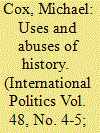

|
|
|
|
|
| Publication |
2011.
|
| Summary/Abstract |
In the by now extended debate about the end of the Cold War and its causes, very little attention has been paid to the role played by historical memory in helping shape the way policy-makers approached the collapse of the post-war order. As this article shows, many, if not most policy elites at the time, confronted the passing of the old world with a great degree of caution and trepidation; and one of the key reasons they did so, it is argued here, is because of their reading of the past. This reading, I go on to suggest, made many of them especially cautious and fearful when faced with great change. In the end of course these changes proved irresistible, and for liberals at least seemed to augur in more peaceful and prosperous times. However, as we shall see here, this unguarded optimism was not much in evidence as the old international system and the other superpower collapsed after 1989. Looking backwards rather than forwards, policy-makers approached the new dawn with much less enthusiasm and optimism than their public pronouncements seemed to indicate at the time or later.
|
|
|
|
|
|
|
|
|
|
|
|
|
|
|
|